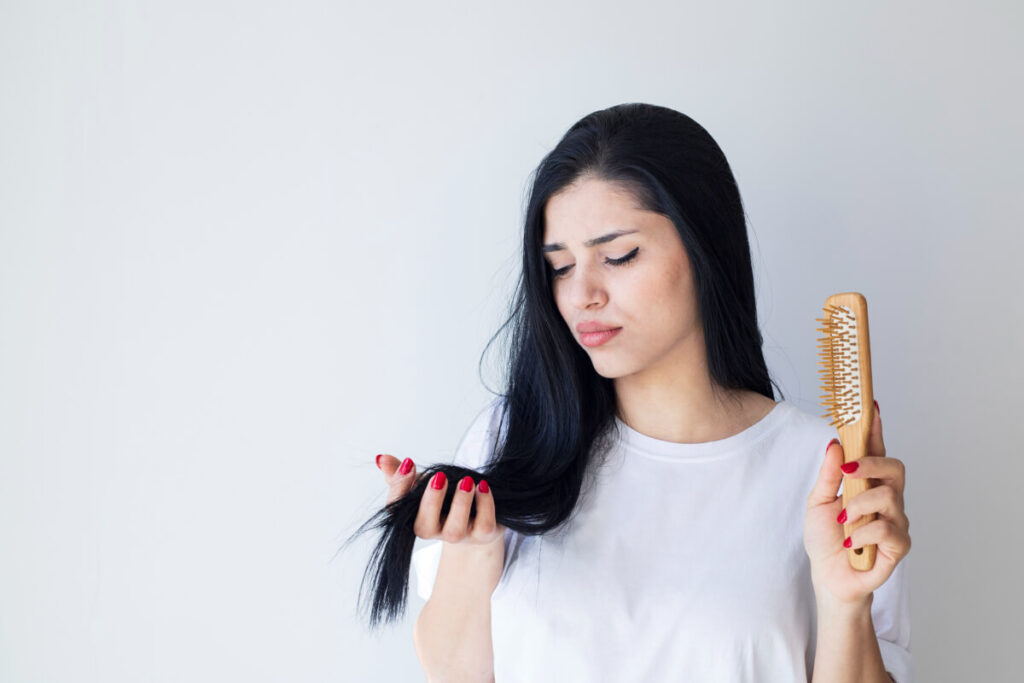Many people use dietary supplements to treat their deficiencies and receive benefits naturally provided by vitamins and minerals. These supplements can fill in the nutrient deficiency that your regular diet cannot provide, which in turn can treat the symptoms of deficiencies and prevent illnesses from developing. Biotin supplements have been a popular choice for a long time, especially for those looking to improve their hair, skin, and nail growth.
So how do biotin supplements help hair growth? Biotin plays a role in creating the bodily protein that gives structure to your hair, which is known as keratin. Biotin also improves your body’s keratin structure for faster and more visible changes in hair growth. This is most effective for those with rare biotin deficiencies, but there isn’t enough evidence to suggest that biotin supplements for those without deficiencies can improve hair quality.
How Do Biotin Supplements Help Hair?
Biotin, also known as vitamin B7 or vitamin H (from the German phrase “haar und haut”, or “hair and skin”), is a water-soluble vitamin that’s part of the vitamin B family. B-vitamins assist in essential bodily functions, including converting nutrients into energy. But how does it help hair specifically?
Your hair (along with your skin and nails) contain keratin, a basic protein that gives structure to your hair. Biotin plays a role in creating and improving your body’s keratin structure. This is why those with a rare biotin deficiency tend to have brittle hair that grows at a slower pace. While there’s a lot of research about biotin’s effects on hair, it’s unknown exactly how biotin plays into creating and affecting keratin production.
For those with biotin deficiencies, taking biotin supplement products can result in visible changes to your hair. It could take months, but you can see new hair grow stronger and healthier and be less prone to hair loss. But for those without biotin deficiencies, the effects of taking biotin are inconclusive. There’s no clinical evidence that suggests that taking biotin supplements on top of what you’re getting from your diet can lead to healthy hair. Some people without biotin deficiencies report positive effects on their hair after taking biotin, but these are mostly anecdotal experiences that a) doesn’t apply to everyone, or b) could’ve been affected by other practices that can improve hair growth.
What Causes Biotin Deficiency?

Biotin deficiencies are rare in countries like the United States. Many food products naturally contain biotin, so a balanced diet can easily prevent you from developing a biotin deficiency.
Because biotin deficiencies are so rare, the Food and Drug Administration (FDA) does not have a recommended dietary allowance as most diets can provide the minimum amount of biotin needed. However, the Institute of Medicine recommends a daily intake of at least 30 micrograms up to 100 micrograms of biotin in your diet. Those with biotin deficiencies can take up to 5 milligrams of supplements per day for six months, since the effects of taking biotin supplements long-term are still unknown.
Certain factors can make you develop a biotin deficiency, including:
- Malnutrition and poor dieting – If you are practicing a diet that does not include food rich in biotin, you may develop a deficiency. Eating a well-balanced diet can prevent biotin deficiencies.
- Medications – Certain types of medicines can prevent your body from absorbing enough biotin from your food, including antibiotics and anti-seizure drugs. Antibiotics can even destroy good bacteria in your digestive system that naturally produces biotin.
- Medical conditions – conditions like Crohn’s disease and colitis can affect your body’s ability to absorb biotin.
- Biotinidase deficiency – this is a rare hereditary disorder where your body cannot reuse biotin like most bodies do. In an average person, biotin can be reused several times before being filtered out because it is a water-soluble vitamin. People with this deficiency can’t reuse biotin, so they’re not making the most out of the nutrients they take in like others do.
- Genetic disorders – other types of deficiencies like holocarboxylase synthetase deficiency, biotin transport deficiency, and phenylketonuria can affect your body’s ability to use biotin. However, holocarboxylase synthetase deficiency and biotin transport deficiency are rare disorders, while newborns are checked for phenylketonuria at birth.
- Pregnancy – there are rare cases of women developing biotin deficiencies when they get pregnant. They may need biotin supplements during their pregnancy and while breastfeeding, but their biotin levels should return to normal afterwards.
- Avidin in your diet – egg yolks are rich in biotin, but if you are eating whole eggs with the whites not fully cooked, you are also consuming avidin, which can neutralize the effects of biotin in your body. Instead of eating whole eggs as your source of biotin, try only eating the egg yolk or finding alternative food sources (like sweet potatoes, organ meats, and spinach).
Those with biotin deficiencies (as well as vitamin B deficiencies) can experience several symptoms, including:
- Hair loss
- Brittle hair
- Brittle nails
- Red skin rashes around the face
- Dry skin
- Fatigue and insomnia
- Dry eyes
- Loss of appetite
- Nausea
- Depression
- A tingling sensation in the hands and feet
- Intestinal discomfort
- Muscle pain
If you are experiencing hair loss and brittle hair but don’t have biotin deficiencies, it may be caused by another deficiency from other essential nutrients that affect hair growth. Your dermatologist may recommend blood tests to see if you have any nutrient deficiencies, or if you possibly have an underlying condition affecting your hair. Supplements cannot improve your hair if you have certain medical conditions, so it’s better to treat the root cause and see if this can affect the quality of your hair.
Benefits of Taking Biotin

Biotin supplements are only associated with improved hair health because of its effects – stronger hair that grows faster – on those with biotin deficiencies. However, while scientific evidence suggests benefits of biotin for hair loss of those with biotin deficiencies, there’s no research to suggest the same benefits for those who don’t have it.
Further research is needed to confirm biotin’s benefits on hair growth for those who do not have biotin deficiencies. However, should you decide to take biotin or B-vitamin supplements, you can receive a number of other benefits that are proven, including:
- Improved metabolism – B-vitamins support metabolism to convert glucose into energy and amino acids. These are essential parts your body needs to perform regular bodily functions.
- Improved cognitive function – biotin is one of many B-vitamins that can affect brain function. People that are deficient in B-vitamins can experience additional symptoms like confusion, irritability, and depression.
- Lower blood sugar levels –people with type 2 diabetes can benefit from taking biotin supplements, as biotin can regulate the way your body’s insulin production.
- Prevent kidney damage – people with insulin-dependent type 1 diabetes are prone to kidney damage, as research suggests that it could reduce the oxidative damage.
- Regulate cholesterol levels – biotin can increase HDL (good cholesterol) and decrease LDL (bad cholesterol)
- Improve fetal development – a third of pregnant women are prone to biotin deficiencies due to their hormones. Mothers take prenatal vitamins that include biotin and folic acid to help with the pregnancy, since biotin is an important substance for embryonic growth.
Shop for Beauty and Wellness Supplies at FACE Med Store
For those with biotin deficiencies, biotin supplements can improve your body’s ability to produce keratin. This can result in stronger hair less prone to breakage. But for those who don’t have biotin deficiencies, there is a chance that biotin supplements won’t give you the results you want. You may want to consider other available dietary supplements if this is the case.
FACE Med Store is the go-to beauty and wellness store for businesses and everyday users. Browse our available tools, supplies, and devices that can improve your aesthetic practices and make your own body and skincare routines more efficient and effective. Achieve the results you want at competitive prices. Reduce business costs and get better deals when you visit our store today.






